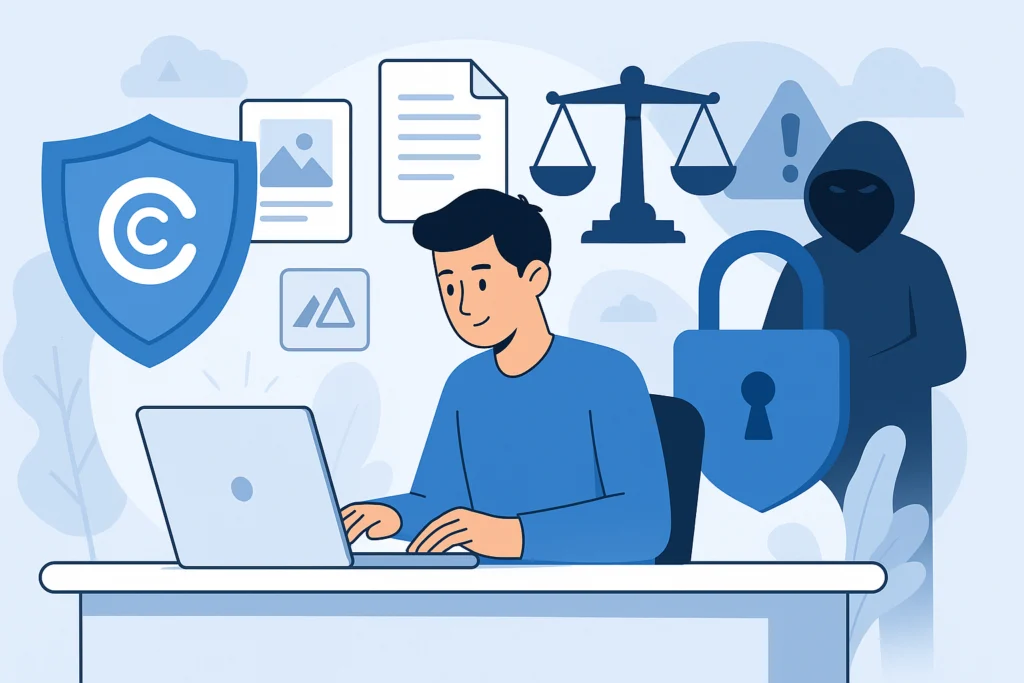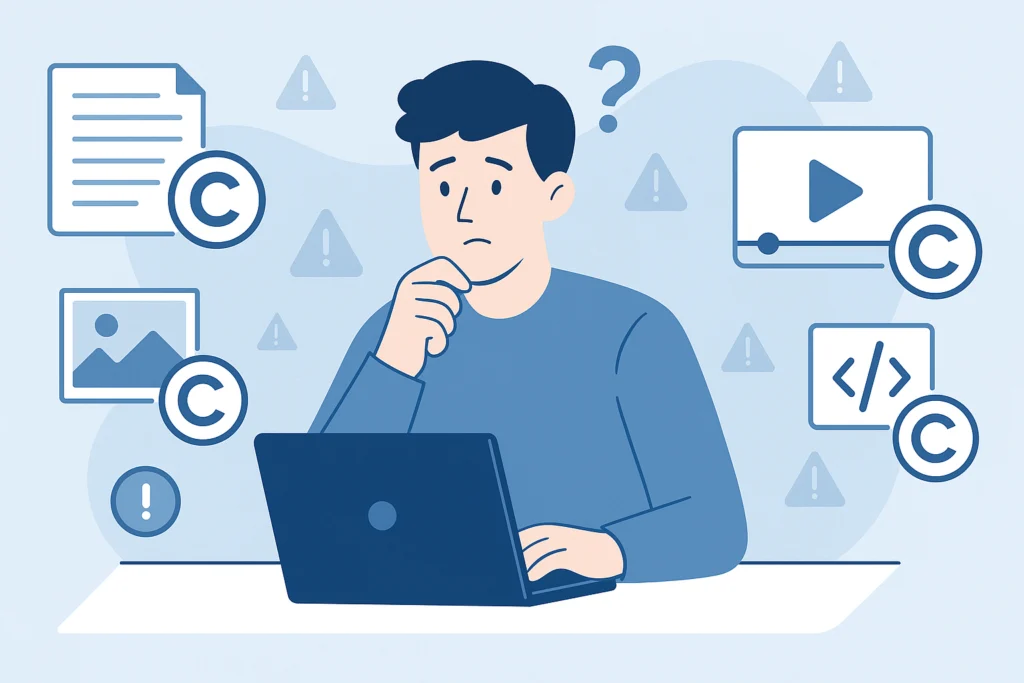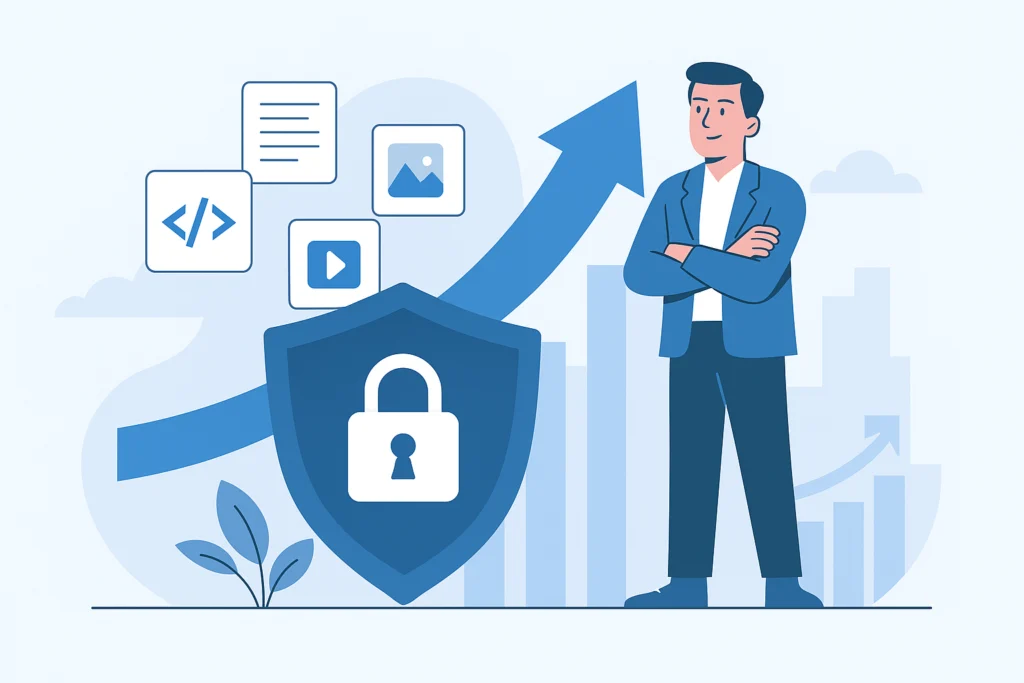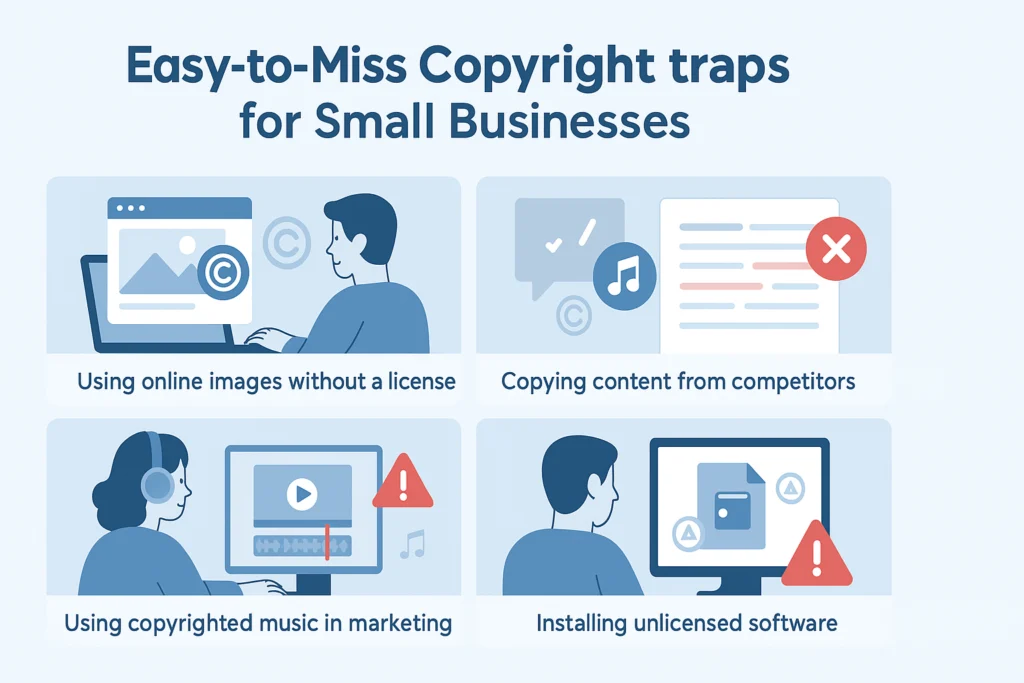Understanding How to Protect Small Business from Copyright Infringement
Copyright infringement can be a serious threat to small businesses, leading to legal complications, financial losses, and damage to brand reputation. Whether you’re a startup, an e-commerce store, or a content creator, understanding how to protect small business from copyright infringement is essential to maintaining your competitive edge.
In this guide, we’ll discuss what copyright infringement is, common risks small businesses face, and practical strategies to safeguard your intellectual property.

What is Copyright Infringement?
Copyright infringement occurs when someone uses copyrighted work without permission from the owner. This could include reproducing, distributing, displaying, or performing copyrighted material without authorization. For small businesses, this might involve someone copying your website content, marketing materials, logos, or even proprietary software. Such actions can lead to financial loss, brand damage, and legal consequences—affecting both the infringer and the original creator.
The Hidden Threats Behind Innocent Mistakes
Copyright laws protect a wide range of creative works, including:
Written content (blogs, articles, eBooks, etc.)
Images, logos, and graphic designs
Videos and audio recordings
Software and code
Unintentional infringement is common—many small businesses unknowingly use online content without proper licensing or attribution.
Even accidental misuse can lead to lawsuits or fines. The digital nature of modern business makes it easy for others to copy and share your content, so proactive measures—like copyright registration, monitoring, and legal tools—are essential. Taking these steps helps you safeguard your content, enforce your rights, and protect your brand’s integrity in today’s online world.

Why Copyright Protection is Crucial for Small Businesses
Unlike large corporations, small businesses often lack the legal resources to fight lengthy copyright disputes. However, ensuring copyright protection is crucial for the long-term sustainability and success of any business. Here are some reasons why safeguarding your intellectual property is essential:
Unauthorized use of your content can lead to financial loss, as competitors may profit from your work without putting in the time and resources that you did to create it. If a competitor copies your website content, product descriptions, or marketing materials, they may attract customers who would have otherwise chosen your business.
Your brand’s uniqueness is what sets you apart from competitors. If others misuse your copyrighted materials, such as logos, slogans, or designs, it can create confusion among customers and dilute your brand’s value. Protecting your intellectual property ensures that your business remains distinct and recognizable in the marketplace.
While small businesses worry about others infringing on their copyright, they must also be cautious about unintentionally using copyrighted content. Many businesses unknowingly use stock images, music, or content without proper licensing, which can result in costly legal battles. By proactively securing the rights to all materials you use, you can avoid expensive fines and lawsuits.
Customers and business partners are more likely to trust a business that takes its intellectual property seriously. Demonstrating that you protect your original content reinforces your authenticity, professionalism, and dedication to ethical business practices. It also signals that you respect the creative work of others, fostering goodwill in the industry.
Small businesses thrive by offering unique products, services, and content. If others freely copy your work, your competitive edge diminishes. By enforcing copyright protection, you can prevent others from replicating your work and ensure that your business remains ahead in the industry.
Intellectual property is a valuable asset for any business. If you plan to sell your business or attract investors, having documented copyright protections increases your company’s worth. Investors and potential buyers want to see that your intellectual assets are secured and not at risk of infringement.
How to Ensure Lasting Protection from Copyright Infringement
By taking the necessary precautions to protect your intellectual property, small businesses can minimize risks, maintain their brand integrity, and ensure sustainable growth in an increasingly competitive digital landscape.

Steps to Protect Your Small Business from Copyright Infringement
Register Your Copyrights
Although copyright protection exists from the moment you create original content, registering your work with the U.S. Copyright Office (or the appropriate office in your country) provides legal proof of ownership. Registration makes it easier to take legal action in case of infringement.
Use Copyright Notices
Adding copyright notices to your website, marketing materials, and creative work serves as a deterrent to potential infringers. A simple notice like “© [Year] [Your Business Name]. All Rights Reserved.” informs others that your work is protected.
Implement Watermarks and Digital Rights Management (DRM)
If you create digital products like images, videos, or software, consider using watermarks or Digital Rights Management (DRM) to prevent unauthorized use. Watermarks make it difficult for infringers to claim your work as their own, while DRM restricts copying or modifying digital content.
Monitor and Enforce Your Copyrights
Regularly check for unauthorized use of your content online by using tools like Google Reverse Image Search to find copied images, Copyscape to detect duplicate content, and DMCA takedown services to report copyright violations. If you discover an infringement, you can send a cease and desist letter or file a Digital Millennium Copyright Act (DMCA) takedown request to have the content removed.
Educate Your Team and Customers
Ensure that your employees and clients understand copyright laws. This helps prevent accidental infringement and fosters a culture of respect for intellectual property. Providing clear guidelines on using third-party content legally can save your business from unintentional legal trouble.
Use Licensed Content and Give Proper Attribution
If you need to use images, music, or other content created by others, make sure to purchase from reputable sources like Shutterstock, Adobe Stock, or Getty Images, use Creative Commons licensed content with proper attribution, and always obtain explicit permission from the content owner before using their work.
Create and Protect Your Terms of Use
Clearly outline how others can use your content by including Terms of Use on your website. This document can specify permissions and restrictions regarding your copyrighted content, legal actions you may take if your copyright is violated, and licensing agreements for any shared materials.
Seek Legal Assistance When Necessary
If you face copyright infringement issues that cannot be resolved through a DMCA takedown or cease and desist letter, consult an intellectual property lawyer. A lawyer can help you assess legal options, draft agreements, and take appropriate legal action if needed.
Common Copyright Infringement Issues Small Businesses Face
Many small businesses unknowingly encounter copyright problems. Being aware of these issues can help you stay compliant and avoid potential lawsuits.
Some common scenarios include:

Safeguarding Your Business Legacy
Understanding how to protect small business from copyright infringement is critical to safeguarding your brand’s reputation and financial stability. By registering copyrights, using copyright notices, monitoring for infringement, and educating your team, you can minimize the risk of unauthorized use of your intellectual property.
Implementing these protective measures ensures that your business operates legally while respecting the intellectual property rights of others.